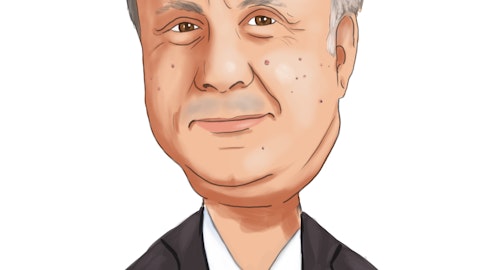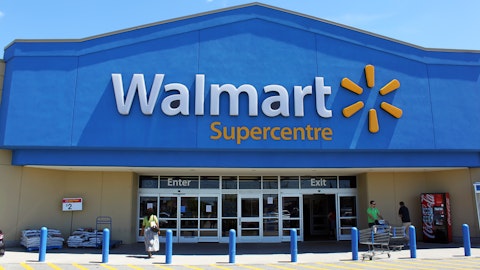Doug Hekking : Yes, real high level. I think 2023 were a little bit lighter than we had been historically, but we are coming off really 3 years of a heavy promotional cadence during the COVID years and it depended on where the individual markets we’re at. So I think you’ll see us tick up from where we were in ’23. This is — we’re in a sales culture. You’re always going to have incentives and promotions. And to Brent’s point, really looking to go back and do those things that will go back and get us traction and sustainable growth going forward. Brent?
Brent Neidig : The direction we’re moving for 2024 is to really look market by market and ensure that we have the right incentive structure and package for each individualized market. In the past, some of these larger promotions have been global in nature, and they’ve been effective to a degree, but sometimes they don’t resonate as well in certain markets. So the intention going forward is to really identify what’s going to motivate and incentivize our local sales leaders and ensure that we’re supporting them the best way that we can.
Operator: Our next question is from Susan Anderson with Canaccord Genuity.
Susan Anderson: Just really quick, it sounds like on the transportation costs, you don’t really expect any increases. I’m just curious about the Suez Canal and how you’re navigating things there. We’ve heard maybe some slight increases transportation providers are trying to pass through.
Walter Noot: Yes. This is Walter. We — if you look at our transportation costs, the biggest extensive cost in the past has been airfreight. And so because of those challenges we’ve had. I think those costs have gone up a slight amount, but most of our routes are not around the Suez Canal. So we really haven’t had those issues.
Doug Hekking : But to your point, that is something that we’ve watched. We’ve seen port strikes in the past and some of these things definitely have an effect, so it is something that we’re monitoring, and we’ll update if we start seeing it have an impact on our business.
Susan Anderson: Okay. Great. And then I guess, so back to Linda’s question on China, it sounds like it’s just more fluctuations in currency. I guess are you seeing that consumer there feel a little bit more pressured from a macro perspective and pulling back on your products at all?
Brent Neidig : Yes, it’s Brent. The Chinese consumer — and when you look at the larger macroeconomic data and you get a housing and other factors that are weighing into that, the consumer definitely is suppressed. And in many categories, they have drawn back. I think the wellness space is quite resilient. The Chinese consumer is still very focused on wellness. And so speaking specifically for USANA we haven’t really seen much fluctuation in that regard, which has been optimistic. Who knows what the future will hold, but we still are quite optimistic in the wellness space. And regardless of what happens from a socioeconomic factor, we think it’s still pretty resilient.
Susan Anderson: Okay. Great. And then I guess just really quick on pricing for 2024. It looks like there was a slight benefit this quarter. Should we expect that to continue in 2024?
Doug Hekking : Yes. So I think what you hear narrated in the fourth quarter is just the year-over-year comp from the adjustments that we made towards the end of the first quarter, beginning of second quarter in ’23. The adjustments that we’d have planned this year are going to be meaningfully less than what we did in ’23. And so I don’t think you’ll see much inflection point relative to our P&L from adjustments in prices. I think we’ll be pretty targeted and looking at specific products that have certain attributes that we have to address. But as a whole, definitely, we won’t be making the same lean into it that we did in ’23.
Susan Anderson: Okay. Great. And then last question just on M&A. I guess, is there any color you can give on kind of either products or categories that you’re thinking about or holes in the portfolio that you would like to fill?
Jim Brown : Yes, this is Jim. We’re going to always do M&A looking at the wellness industry – excuse me – and that’s kind of our focus that we get product lines and everything that match within that. I was just talking this morning to Walter, and they have a queue of six or seven companies that are interesting. Again, they’re all in the wellness area. We always look for companies that are healthy, and we want to help them continue to grow. M&A is an interesting thing where no matter how eager you are to get in, you’ve got to find the right deals and the deals that resonate with the company and make a smart decision and it just takes time to evaluate those.
Operator: Our next question is from Ivan Feinseth with Tigress Financial Partners.
Ivan Feinseth : Congratulations on the strong year end finish. I have two questions. One, on the sales incentives that you got some great results on. Can you give some details on that? And what do you find works best? And what have you experienced it has not worked well?
Doug Hekking : Yes. I think Brent captured it well. I think what we’re seeing when we do something that’s more far reaching and then the one in the fourth quarter was for the most part available in most markets. That same type of approach doesn’t work in every market. The particular one we ran in the fourth quarter was really rewarding growth in sales to new customers. And you have a market like China who is a very entrepreneurial spirit, really have a strong belief in the health and wellness space. And so when we do some of the stuff in line with this, China is a market, those resonate in pretty well. I think we’ve looked at value proposition promotions here or there, and those get received well. But typically, when you do those, those are marketing to your existing customer base, and you’re not seeing necessarily an inflection in customer counts.



